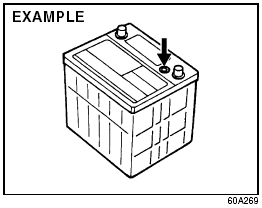Battery

Battery

WARNING:
Batteries produce flammable hydrogen
gas. Keep flames and sparks
away from the battery or an explosion
may occur. Never smoke when working
near the battery.

WARNING:
When checking or servicing the battery,
disconnect the negative cable.
Be careful not to cause a short circuit by allowing metal objects to contact the battery posts and the vehicle at the same time.

WARNING:
To avoid harm to yourself or damage
to your vehicle or battery, follow the
jump starting instructions in the
“EMERGENCY SERVICE” section of
this manual if it is necessary to jump
start your vehicle.

WARNING:
Battery posts, terminals and related
accessories contain lead and lead
compounds. Wash hands after handling.
Your vehicle is equipped with a battery that requires infrequent maintenance. You will never have to add water. You should, however, periodically check the battery, battery terminals and battery hold-down bracket for corrosion. Remove corrosion using a stiff brush and ammonia mixed with water, or baking soda mixed with water. After removing corrosion, rinse with clean water.
The test indicator on the top of the battery provides information on the condition of the battery.
If your vehicle is not going to be driven for a month or longer, disconnect the cable from the negative terminal of the battery to help prevent discharge.
See also:
Remote Audio Controls (if equipped)
Remote Audio Controls (if equipped)
You can control basic functions of the
audio system with the switches on the
steering wheel. For details, refer to “Audio
Systems” in the “INSTRUMENT PA ...
Starting the Engine
Before Starting the Engine
1) Make sure the parking brake is set fully.
2) Manual Transmission – Shift into “N”
(Neutral) and depress the clutch pedal
all the way to the floor.
Hold it whil ...
So, what gives?
I am convinced, after driving several versions of the Kizashi, including the
subject of this week’s column, the 2011 Kizashi Sport SLS sedan, that Suzuki can
make cars better than, or certainly ...
